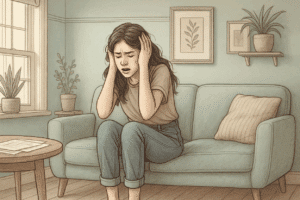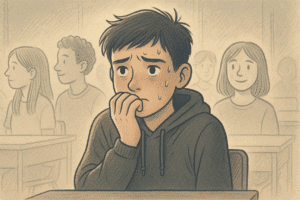Written By:

Communications B.A.
Social Media Manager
Reviewed By:

Aja Chavez
AMFT, APCC
National Executive Director
Medically Reviewed By:

Dr. William Dodge
MD-MMM, FACEP, FAAEM
Chief Medical Officer
Mental health intervention refers to the actions taken to address mental health problems before they become severe or unmanageable. For teens, this is a critical time for mental health, as they undergo numerous physical, emotional, and social changes. In this article, we will discuss why early intervention in teen mental health disorders is crucial, the potential benefits of preventative mental health care, and how various interventions can support youth mental health.
Understanding Teen Mental Health
Mental health and adolescence are deeply connected, as this period is marked by rapid brain development and emotional changes. During this time, teenagers are more vulnerable to mental health disorders such as anxiety, depression, and behavioral issues. Studies show that half of all lifetime mental illnesses begin by the age of 14, making early intervention essential. This is where mental health prevention and early treatment strategies come into play.
Why Early Intervention Matters?
Early intervention involves identifying symptoms of youth mental health disorders and addressing them before they escalate. When teens receive timely mental health intervention, they have a better chance of managing their symptoms and leading a balanced life. According to research, untreated mental health issues during adolescence can result in long-term negative outcomes, including academic failure, substance abuse, and social isolation.
Preventative mental health approaches aim to stop mental health disorders from developing in the first place. These strategies include teaching coping mechanisms, emotional regulation, and stress management to teens, which can reduce the likelihood of severe mental health issues later in life.
Common Mental Health Disorders in Adolescence
Adolescence is a period where certain mental health disorders are more likely to manifest. Some common youth mental health disorders include:
- Anxiety disorders: Persistent worry or fear that affects daily activities.
- Depression: Long-lasting feelings of sadness or loss of interest in activities.
- Attention Deficit Hyperactivity Disorder (ADHD): Inattention, hyperactivity, and impulsivity.
- Eating disorders: Conditions such as anorexia nervosa or bulimia that affect eating habits and self-image.
Recognizing these symptoms early on is vital in ensuring proper mental health intervention. With the right support, teens can navigate their mental health challenges and develop resilience.
Effective Interventions for Mental Health Disorders
Different interventions can be employed to address mental health challenges in adolescents. These interventions for mental health disorders range from therapy and counseling to school-based programs and community support services.
- Therapy and Counseling: Cognitive Behavioral Therapy (CBT) is one of the most common approaches used for treating youth mental health disorders. It helps teens identify and change negative thought patterns that contribute to their anxiety, depression, or other conditions.
- School Programs: Schools play a crucial role in promoting mental health and well-being. Many schools now have mental health counselors or social workers on staff who can provide support for students facing emotional challenges. Some schools also implement programs focused on preventative mental health education, teaching students about stress management and emotional wellness.
- Family Involvement: Family therapy can be particularly effective, as it helps parents and caregivers understand their teen’s mental health struggles and how best to support them.
- Medication: In some cases, medication may be prescribed to help teens manage specific symptoms, such as those related to anxiety or depression. However, medication should always be used in conjunction with therapy or other interventions.
The Role of Preventative Mental Health Care
Preventative mental health care is designed to address potential issues before they escalate into serious problems. This type of care includes mental health screenings in schools, community outreach programs, and parental education on recognizing early signs of mental health disorders. By focusing on mental health prevention, communities can reduce the number of teens suffering from long-term mental health issues.
One successful preventative mental health strategy involves teaching resilience and emotional regulation to adolescents. Programs that focus on these skills can help teens navigate the ups and downs of adolescence with greater ease, reducing the likelihood of developing a mental health in adolescence.
Barriers to Mental Health Intervention
While early mental health intervention is important, there are still barriers that prevent teens from accessing the care they need. These barriers include:
- Stigma: Many teens and their families are reluctant to seek help due to the stigma surrounding mental health issues.
- Lack of Access: In some communities, mental health resources are limited or difficult to access. This can be due to financial constraints, lack of transportation, or insufficient mental health professionals in the area.
- Awareness: Some parents and caregivers may not be aware of the signs of mental health disorders or the importance of early intervention.
Addressing these barriers requires a combined effort from schools, healthcare providers, and communities to ensure that teens receive the support they need.
The Importance of Ongoing Support
Early intervention is just the first step. For long-term success, teens need ongoing support to manage their mental health throughout adolescence and into adulthood. This support can come from parents, schools, mental health professionals, and community organizations. Consistent check-ins, therapy sessions, and mental health education can help teens stay on track and develop healthy coping mechanisms.
Youth mental health disorders may not always have a quick fix, but with the right interventions and ongoing care, many teens can learn to manage their conditions effectively.
Early mental health intervention is key to addressing youth with mental health disorders before they become more severe. With the right interventions, including therapy, school programs, and preventative mental health care, teens can navigate the challenges of adolescence more successfully. Parents, educators, and communities all play a role in supporting mental health and adolescence, ensuring that teens receive the care they need.Learn more about how Mission Prep can support teen mental health intervention programs.






















